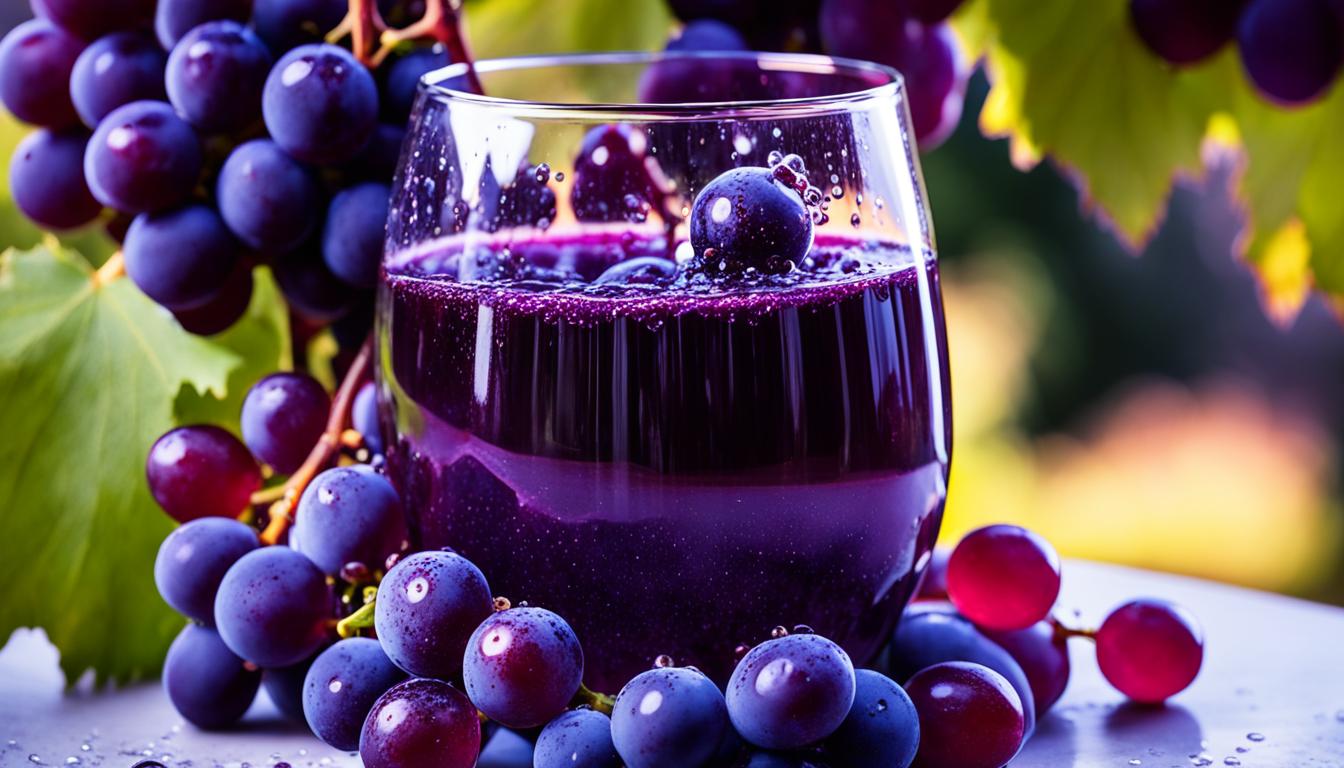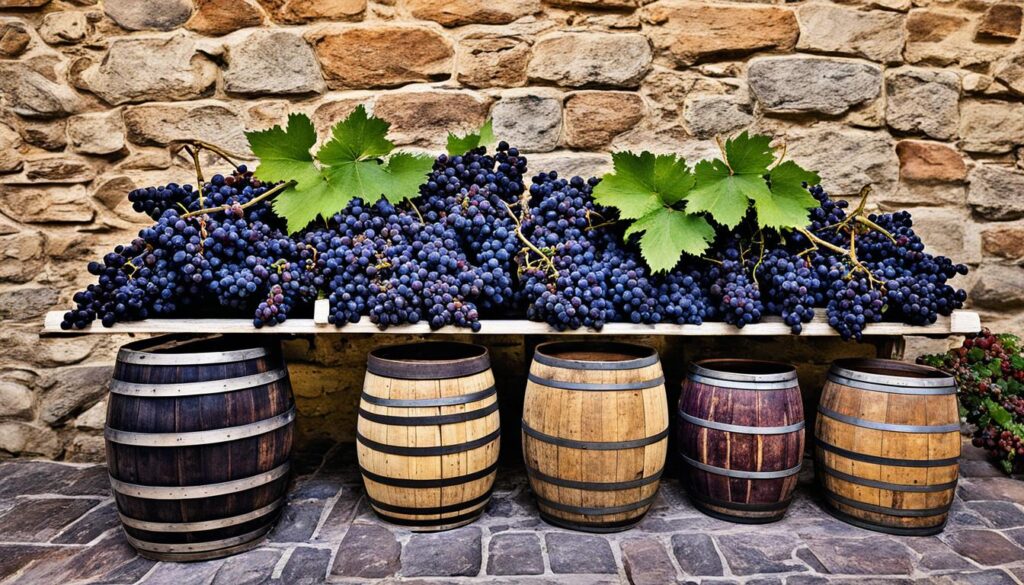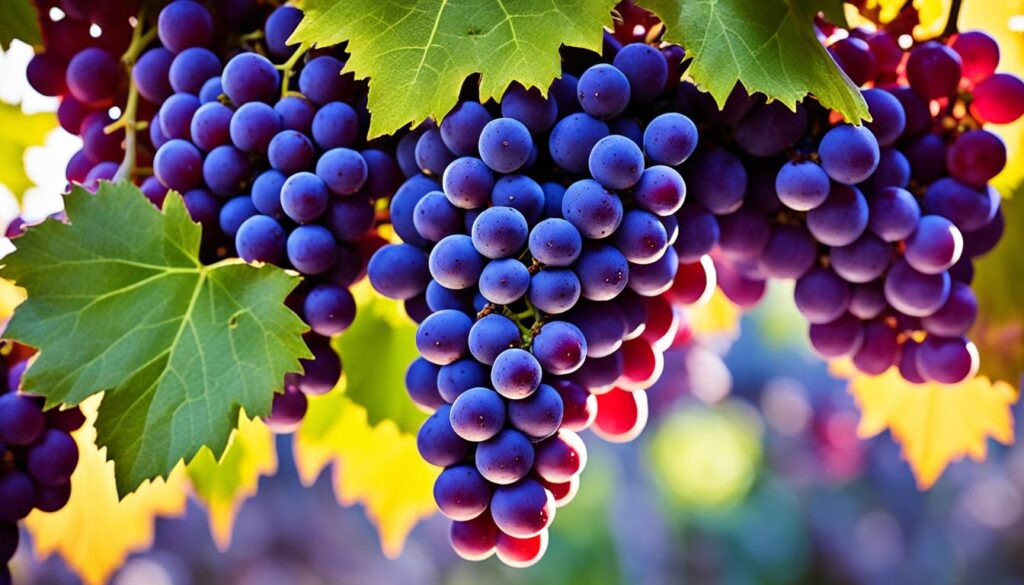Can Grape Juice: Preserving Nature’s Sweet Nectar

Have you ever wondered about the captivating story behind the vibrant purple elixir that graces our tables and delights our taste buds? Grape juice, one of the oldest and most beloved beverages in human history, holds a hidden world of rich tradition, natural goodness, and versatile culinary possibilities. In this article, we’ll uncover the art of preserving nature’s sweet nectar, exploring the benefits, history, and innovative uses of this timeless delight.
Key Takeaways
- Grape juice is one of the most popular fruit beverages in the United States, with a rich history dating back thousands of years.
- Discover the different types of grape juices and their unique flavor profiles, from the foxy Concord grapes to the sweet and low-acid western grape juices.
- Learn about the art of preserving grape juice through pasteurization, ensuring its natural goodness and longevity.
- Explore the versatile culinary applications of grape juice, from refreshing drinks to flavorful marinades and sauces.
- Uncover the health benefits of grape juice, including its antioxidant properties and potential to support heart health and immune function.
The Irresistible Allure of Organic Grape Juice
The taste of organic grape juice is a true delight for the senses. The natural sweetness of freshly pressed grapes bursts forth with every sip, creating a flavor profile that is both fruity and refreshing. Without any synthetic additives or pesticides, organic grape juice allows you to savor the pure essence of nature’s bounty. Whether you prefer the rich and bold flavors of red grapes or the crisp and slightly tart taste of green grapes, there’s a wide range of organic grape juice options to suit every palate. The smooth, silky texture adds another layer of enjoyment, quenching your thirst while leaving behind a satisfying aftertaste that will have you craving more.
Taste: Nature’s Delightful Flavor Burst
Organic grape juice is made with only the purest ingredients, ensuring a true treasure in the lineup of natural foods. CADIA® organic grape juice is made with Organic Grape Juice, and is also Gluten-Free, Non-GMO, and Vegan. You can trust that you’re enjoying a high-quality product that is free from artificial additives, colors, or preservatives, allowing you to savor the authentic flavor of nature’s sweet nectar.
Made: The Pure Quality You Can Trust
With its commitment to quality and purity, organic grape juice stands out as a refreshing and wholesome choice. Sipping on a glass of this natural elixir is not just a treat for the taste buds, but a celebration of nature’s finest offerings. Whether you’re looking to quench your thirst, boost your nutrition, or simply indulge in a moment of pure delight, organic grape juice is the answer.
Versatile Uses of Organic Grape Juice
Organic grape juice is a versatile beverage that can be enjoyed on its own or used as an ingredient in a variety of recipes. Its sweet and refreshing taste makes it a popular choice for both children and adults. Organic grape juice can be a healthy alternative to sugary soft drinks, providing natural sweetness without the added artificial flavors, colors, or preservatives found in many commercial beverages.
Organic grape juice can be used as an ingredient in smoothies, cocktails, marinades, and sauces, adding depth and a hint of sweetness to both sweet and savory dishes. Whether you’re looking to hydrate, enhance your culinary creations, or simply indulge in something deliciously wholesome, organic grape juice offers endless possibilities.
Flavonoids found in grape juice can raise the level of HDL (good) cholesterol, which may prevent blockage of arteries and promote a healthy heart. Resveratrol, present in grape juice, could potentially prevent the formation of tumors, aiding in cancer prevention. Drinking grape juice can also increase nitric oxide levels in the body, reducing the formation of blood vessel clots and potentially lowering the risk of heart attacks.
| Juice | Organic | Calories | Sugar | Certification |
|---|---|---|---|---|
| R.W. Knudsen Family Organic Juice Concord Grape | Yes | 160 | 36g | USDA Organic, Non-GMO Project Verified |
The R.W. Knudsen Family Organic Juice Concord Grape contains 100% juice, with no added sugar, preservatives, or artificial flavors, appealing to health-conscious consumers. The juice is made with organic Concord grape concentrate and filtered water, ensuring a pure and natural product.
Organic grape juice can be a versatile ingredient in a variety of recipes, from sweet to savory. Whether you’re looking to add a touch of sweetness to a marinade or create a refreshing cocktail, organic grape juice is a versatile and nutritious choice.
A Centuries-Old Tradition: The History of Grape Juice
Grapes have been cultivated for thousands of years, making grape juice one of the oldest beverages in human history. The cultivation of grapes dates back to around 6000 BC in the Middle East and Mediterranean regions, and ancient civilizations like the Egyptians, Greeks, and Romans were known to consume grape juice as a staple part of their diets.
In ancient times, grape juice was not only enjoyed for its taste but also revered for its medicinal properties, believed to boost energy levels, improve digestion, and treat various ailments. Today, organic grape juice continues to be popular among health-conscious consumers who appreciate its natural sweetness and numerous health benefits.
Testimonial: A Taste of Nature’s Sweetness
“I always choose organic grape juice for my family because I know it is free from harmful pesticides and chemicals. Plus, the taste is out of this world! It’s like sipping on nature’s sweet nectar,” says Jolene A.
Grape juice has a rich history, with Welch’s Grape Juice Company, founded in 1893, playing a significant role in popularizing the beverage. The company’s flash pasteurization method and focus on providing a safe, high-quality product contributed to the widespread adoption of grape juice, particularly among religious communities that preferred it over fermented wine.
The 18th amendment, which banned alcohol in the United States in 1919, also contributed to the increased popularity of grape juice. With the prohibition of alcohol, grape juice became a popular alternative, further solidifying its place in American culture.

Today, grape juice remains a beloved and versatile beverage, enjoyed for its refreshing taste, natural sweetness, and numerous health benefits. From its ancient origins to its modern-day popularity, the history of grape juice is a testament to the enduring appeal of this centuries-old tradition.
Nutritional Powerhouse: Grape Juice’s Goodness Unveiled
Organic grape juice is not merely a delightful treat; it’s a nutritional powerhouse that offers an array of health benefits. Packed with essential vitamins, minerals, and antioxidants, this vibrant beverage is a true gift from nature.
A serving of 8 fl. oz. of organic grape juice contains 150 calories, 0g of fat, 37g of total carbohydrates, and 36g of natural sugars. It’s also a good source of potassium, providing 260mg or 6% of the daily value. Grape juice is low in sodium, with only 15mg per serving, and it’s free from cholesterol, trans fat, and added sugars.
The combination of natural sweetness, refreshing acidity, and a nutritional profile that includes antioxidants, vitamins, and minerals makes organic grape juice a true nutritional powerhouse. Enjoy the goodness of nature’s sweet nectar and reap the benefits of this delightful beverage.
Unlocking the Grape Juice Nutrition
Red grape juice is enriched with an array of vitamins, minerals, and antioxidants. The vibrant color of red grape juice comes from powerful compounds like resveratrol and polyphenols, which offer a range of health benefits:
- Supports cardiovascular function and helps maintain optimal blood pressure levels
- Possesses potent antioxidant properties to combat oxidative stress and inflammation
- Fights skin-aging free radicals, promoting a youthful appearance
- Rejuvenates skin by enhancing hydration and elasticity
- Strengthens the body’s defense system with immune-boosting potential
Grape juice’s impressive nutritional profile extends beyond its delightful flavor, providing a wealth of health-promoting benefits that nourish the body from the inside out.
“Grape juice is not only a delicious treat, but it’s also a nutritional powerhouse that can support overall health and well-being.”

Can Grape Juice: The Art of Preserving Nature’s Nectar
Pasteurization: Ensuring Quality and Longevity
Preserving the natural sweetness and goodness of homemade grape juice is a rewarding and straightforward process. At the heart of successful home canning lies the pasteurization technique, which ensures the juice’s quality and extends its shelf life.
Pasteurization involves heating the freshly pressed can grape juice to a specific temperature for a set duration, effectively eliminating any harmful microorganisms while retaining the juice’s flavor, aroma, and nutritional value. By following proper canning methods, you can enjoy the taste of nature’s sweet nectar year-round, without compromising the integrity of this timeless drink.
The process of pasteurization is a crucial step in preserving the quality and longevity of grape juice concentrate. By heating the juice to the appropriate temperature, you can kill off any potentially harmful bacteria, ensuring the juice remains safe for consumption. This not only extends the shelf life of your homemade grape juice but also preserves the natural sweetness and vibrant color that make this beverage so delightful.
With a bit of know-how and the right equipment, you can easily incorporate the pasteurization step into your home canning routine. By mastering this technique, you’ll be able to savor the taste of freshly pressed grape juice all year round, without sacrificing the quality or nutritional value that makes it such a beloved natural treat.
“Preserving the natural sweetness and goodness of homemade grape juice is a rewarding and straightforward process.”
Late Harvest Wines: Exploring Nature’s Sweet Indulgence
The world of wine is a tapestry woven with countless varieties, each offering a unique sensory experience. Among the most captivating are the late harvest wines, also known as sweet wines. These delectable creations are the result of winemakers’ patience and artistry, allowing their grapes to linger on the vine until they reach a state of perfect ripeness, concentrating the sugars and flavors.
Commonly made from grape varieties like Riesling, Vidal Blanc, Sauternais, and Muscat, late harvest wines showcase a wide range of sweetness levels and flavor profiles. Whether sipped as a sweet finale to a meal or savored on a crisp autumn evening, these wines invite us to appreciate the nuances of each grape variety and the craftsmanship of the winemaker.
The art of producing late harvest wines is a testament to the winemaker’s skill. The grapes are left to hang on the vines longer, allowing the natural sugars to concentrate as the water in the grapes evaporates. This process, known as late harvest, can result in a Brix level (a measure of sugar content) of over 30, compared to the typical 20-25 Brix found in regular table wines.
The sweetness of late harvest wines is not the only allure; these wines also boast a complexity that sets them apart. As the grapes ripen, they develop a range of flavors, from honeyed notes to hints of dried fruits and spices. The interplay of sweetness and acidity creates a harmonious balance, making each sip a delightful sensory experience.
Whether you prefer the delicate floral notes of a Riesling late harvest or the rich, caramelized flavors of a Sauternes, the world of late harvest wines offers a true indulgence for the senses. Savor the unique character of these exceptional sweet wines and embark on a journey of discovery, exploring the white wines that nature has so generously bestowed upon us.
“The true connoisseur savors the nuanced flavors of a well-crafted late harvest wine, each sip revealing the art and patience of the winemaker.”
Conclusion
Grape juice has been a beloved beverage for centuries, cherished for its natural sweetness, refreshing flavor, and numerous health benefits. From the rich history of grape cultivation to the versatile ways it can be enjoyed, canning grape juice at home allows you to preserve the essence of nature’s sweet nectar. By understanding the art of pasteurization and exploring the diverse world of late harvest wines, you can savor the goodness of grape juice in all its forms, indulging in a delightful taste of nature’s bounty.
Whether you’re seeking a healthy alternative to sugary drinks or looking to incorporate grape juice into your culinary creations, this timeless beverage offers endless possibilities for enjoyment. The grape juice benefits, from its antioxidant-rich properties to its potential cardiovascular and neurological advantages, make it a nutritional powerhouse that can be enjoyed by people of all ages. As research continues to uncover the vast grape juice nutrition profile, it’s clear that this natural elixir holds the key to a healthier, more vibrant lifestyle.
As you embark on your journey of exploring the world of can grape juice, remember that moderation and proper precautions are essential. Consult with your healthcare provider to ensure that this beverage aligns with your individual needs and any existing medical conditions. With the right approach, you can unlock the full potential of grape juice and savor the sweet rewards of nature’s finest gift.







